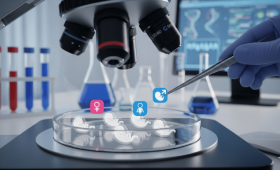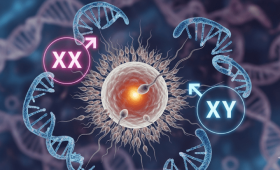What is the Egg Retrieval Process?
The egg retrieval process is one of the most important stages of IVF treatment. It is a procedure where mature follicles developed in the ovaries are collected using a thin needle through the vagina under the guidance of ultrasonography. Since it is generally performed under light sedation (a sleep-like state), the patient does not feel any pain or discomfort. The collected eggs are delivered to the embryologists in the laboratory for the fertilization process. This critical step is vital for a successful embryo development.
How Long Does the Egg Retrieval Procedure Take?
The egg retrieval procedure is a relatively short process. The duration of the procedure varies depending on the number of follicles in the patient’s ovaries. It is generally completed in an average of 15 to 20 minutes. Patients are kept under observation in a recovery room for a few hours after the procedure and are discharged once the effects of the anesthesia have worn off. This quick and comfortable procedure makes the treatment process easier for couples.
What Preparations Should Be Made Before the Procedure?
Being prepared before the egg retrieval procedure is very important for the process to proceed safely and smoothly. Eating and drinking should be stopped from midnight the night before the procedure. No makeup, nail polish, perfume, or jewelry should be worn. Before the procedure, you must meticulously follow the instructions given by your doctor. You should definitely inform your doctor about any medications and additional supplements you are using.
Does the Egg Retrieval Procedure Hurt?
Since the egg retrieval procedure is performed under light sedation, the patient does not feel any pain during the procedure. Sedation ensures that the patient feels relaxed and comfortable, allowing the procedure to be completed without any discomfort. A slight cramping sensation or discomfort may be felt after the procedure, but this can usually be easily controlled with simple painkillers recommended by your doctor. The pains are generally short-lived and mild.
What is Sedation and Why is it Used?
Sedation is a type of anesthesia that puts the patient in a state of deep relaxation and calm without losing consciousness. During the egg retrieval procedure, sedation is administered to eliminate the patient’s pain sensation and tension, ensuring a comfortable experience. This method carries less risk than general anesthesia, and the patient recovers quickly after the procedure. Clinics working with Cure Holiday use the most modern sedation methods to keep patient comfort at the highest level.
On Which Day is the Egg Retrieval Procedure Performed?
The egg retrieval procedure is performed approximately 34-36 hours after the trigger shot (hCG) is administered to ensure that the eggs have reached full maturity, following the use of egg development injections (gonadotropins). This timing is of critical importance for obtaining the highest number of mature eggs and is carefully planned by your doctor. Therefore, you should absolutely not skip this step.
How Many Eggs Need to Be Collected?
The ideal number of eggs to be collected varies from person to person, and the quality is as important as the quantity. However, in general, more mature eggs mean a greater chance of embryo development in the laboratory. This, in turn, increases the chance of pregnancy. For a successful treatment, the goal is usually to obtain 8-15 mature eggs.
What Does the Quality of the Collected Eggs Depend On?
The quality of the collected eggs depends on many factors, especially the woman’s age. As age advances, the quality and number of eggs decrease. In addition, ovarian reserve, the applied treatment protocol, the medications used, and eating habits also affect egg quality. High-quality eggs are a fundamental requirement for the formation of a healthy embryo.
Is Pain Felt After Egg Retrieval?
After the procedure, a mild cramp or a feeling of fullness in the pelvic area may be experienced. This sensation is generally similar to menstrual cramps and subsides on its own within a few days. If necessary, this discomfort can be easily relieved with simple painkillers recommended by your doctor. The pains are usually short-lived and mild.
How Long Should I Rest After the Procedure?
It is recommended that the patient rests and is kept under observation in the clinic for a few hours after the egg retrieval procedure. This period is for the effects of the anesthesia to completely wear off and for the patient to feel well. Resting during this process helps the body recover and reduces the risk of possible complications.
What Complaints Can Be Seen After Egg Retrieval?
Common complaints after egg retrieval include mild abdominal bloating, fullness in the pelvic area, mild vaginal bleeding or spotting. These symptoms usually disappear within a few days. However, it is important to contact your doctor immediately in case of severe symptoms such as severe pain, heavy bleeding, or high fever.
When Can I Return to Normal Life After the Procedure?
Most patients can return to their normal daily life the day after the egg retrieval procedure. However, it may be necessary to avoid heavy sports, physical activities, and sexual intercourse for a while. It is best to follow your doctor’s specific advice.
Is the Egg Retrieval Procedure Risky?
Although the egg retrieval procedure is a very safe procedure, like any medical procedure, it carries a very low risk. The rarest risks include infection, bleeding, damage to nearby organs (such as the intestines or bladder), or Ovarian Hyperstimulation Syndrome (OHSS). When performed by an experienced team, these risks are minimized. The clinics that Cure Holiday works with offer services at the highest standards.
What Does the Success of Egg Retrieval Depend On?
The success of egg retrieval depends on the patient’s individual condition, the number of follicles, egg quality, the doctor’s experience, and the technical equipment of the clinic. As the number of high-quality and mature eggs increases, the probability of a successful embryo development and achieving a pregnancy also increases. Therefore, determining the correct treatment protocol is very important.
What is Ovarian Hyperstimulation Syndrome (OHSS)?
OHSS is a condition that occurs when the body overreacts to the hormone medications used to stimulate the ovaries. The ovaries swell, and fluid can accumulate in the abdominal cavity. Although severe cases are rare, special protocols (such as medications that reduce the risk of OHSS and freezing all embryos) are applied for at-risk patients. Cure Holiday‘s partner clinics use modern methods to prevent this condition.
Can All Collected Eggs Be Used?
No, not all collected eggs can be used. Among the collected eggs, there may also be immature, low-quality, or degenerated ones. Only mature and healthy eggs are selected for the fertilization process. Therefore, the number of mature and healthy eggs is more important than the total number of collected eggs.
Where Are the Collected Eggs Stored?
The collected eggs are examined by embryologists in a special laboratory environment and are prepared for the fertilization process. These laboratories, where the eggs and embryos are stored, are designed to provide ideal conditions of temperature, humidity, and sterilization. This environment is of critical importance for the healthy development of embryos.
Is Egg Retrieval and Sperm Collection Done at the Same Time?
Yes, the egg retrieval procedure and the collection of sperm from the male are usually performed on the same day and at the same time. This ensures that the fertilization process can begin immediately and maintains the synchronization of the couple in the treatment process. If obtaining sperm from the male patient requires a surgical procedure, this procedure is also done on the same day.
What Medications are Used After the Procedure?
After the egg retrieval procedure, medications containing the hormone progesterone are usually used to prepare the uterine lining (endometrium) for embryo transfer and to support the pregnancy. These medications can be in the form of a vaginal gel, suppository, tablet, or injection. Your doctor will determine the most suitable medication protocol for you. This hormonal support significantly increases the chance of pregnancy.

When is the Pregnancy Test Done After Egg Retrieval?
The pregnancy test is not done immediately after the egg retrieval procedure, but approximately 10 to 12 days after the embryo transfer. This test is determined by measuring the Beta-hCG hormone level in the blood. It is important to be patient during this time and not to test early, as the results may be misleading.
How Long Does the Total Egg Retrieval and IVF Process Last?
The total duration of the IVF treatment varies depending on the patient’s treatment protocol. However, generally, the process from ovarian stimulation to embryo transfer takes about 15-20 days. This duration covers the entire treatment process for patients coming from abroad and makes planning easier.
How Does Cure Holiday Provide Support in This Process?
Cure Holiday offers comprehensive support to make the egg retrieval process as easy as possible for you. A personal patient coordinator is assigned to you throughout your treatment. This coordinator is by your side at every stage, from airport transfers to accommodation, from arranging your hospital appointments to interpreting services. This way, you can focus solely on the treatment.
How Many Follicles Should There Be During Egg Retrieval?
The number of follicles during the egg retrieval procedure varies depending on the ovarian reserve. While it is not possible to specify an exact number, having a sufficient number and size of follicles increases the chance of obtaining mature eggs. Your doctor will regularly monitor the development of your follicles with ultrasound.
Is There an Age Limit for Egg Retrieval?
Although there is no legal age limit for the egg retrieval procedure itself, there is a 40-year age limit for IVF treatment in Turkey. However, as age advances, the quality and number of eggs decrease, so the success of egg retrieval also decreases. Therefore, starting treatment as early as possible increases the success rate.
What Should the Nutrition Be Like Before the Egg Retrieval Procedure?
You should continue to eat a healthy and balanced diet before the egg retrieval procedure. Drinking plenty of water and consuming foods rich in protein and vitamins can have a positive effect on egg quality. It may be beneficial to avoid gas-producing foods, those that cause bloating, and caffeinated beverages before the procedure.
Is Sexual Intercourse Forbidden After the Egg Retrieval Procedure?
It is recommended that you abstain from sexual intercourse for a period of time after the egg retrieval procedure. This is to allow the ovaries, which may be sensitive after the procedure, to relax and to minimize the risk of infection. Your doctor will give you clear instructions on when you can resume sexual activity.
Can I Continue to Work After the Procedure?
Most patients can return to work the day after the egg retrieval procedure, but if you have a physically demanding job or do not feel well, it would be best to take a day off. You should remember that your body needs rest after the procedure.
What is the Success Rate of Egg Retrieval for Those with Low Ovarian Reserve?
In patients with low ovarian reserve, the number of eggs collected may be low, but this does not prevent a successful pregnancy. What is important is the quality of the small number of eggs. Your doctor will determine the most suitable treatment protocol for this situation and will try to increase the egg quality and the chance of pregnancy.
What is a Failed Egg Retrieval?
Rarely, a situation where no eggs can be collected during the egg retrieval procedure may occur. This condition is called “empty follicle syndrome.” This does not mean that the treatment has failed. Your doctor will investigate the cause of the situation and create a new treatment plan and guide you through this process.
What Kind of Conveniences Are Provided for Patients Coming from Abroad?
For patients coming from abroad, Cure Holiday simplifies the entire process from start to finish. A dedicated consultant is assigned to you to organize every detail for you, from preliminary tests in your home country to your appointments in Turkey, from your accommodation and airport transfers to interpreting services. This way, we minimize the stress that comes with getting treatment in a foreign country.



